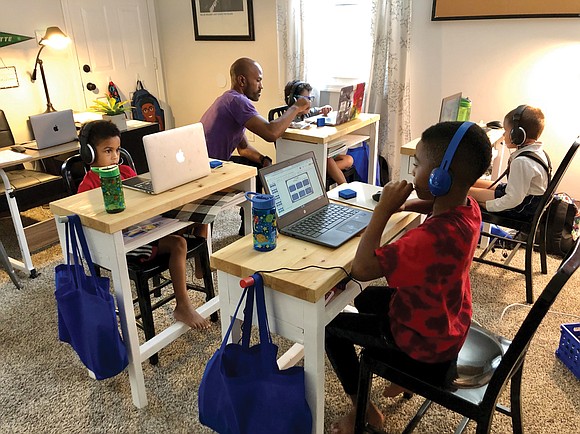Cozy with Chromebook
Richmond School Board votes for students to continue virtual classes through the end of the academic year
Ronald E. Carrington | 12/10/2020, 6 p.m.

Richmond students won’t be going back into school buildings for in-person classes next semester.
The Richmond School Board voted 8-1 Monday night to continue the school system’s virtual learning through the end of the 2020-21 school year because of the health and safety threat from the area’s unchecked rise in COVID-19 cases and hospitalizations.
Superintendent Jason Kamras, who said his decision supporting continued virtual learning for Richmond Public Schools was one of the hardest of his career, cited the alarming health data showing the rise in COVID-19 infections in Richmond.
He also said results of an RPS survey showed that 80 percent of teachers and staff and more than half of nearly 6,000 families who responded preferred continuing virtual classes when the second semester begins Feb. 8.
School Board member Jonathan Young, 4th District, was the lone dissenting vote. Mr. Young proposed allowing some special needs students to return to classrooms for in-person instruction. But his proposal died from a lack of backing from any other board members to be brought to a vote.
Mr. Kamras and several board members said there would be a problem getting students to school under Mr. Young’s proposed hybrid in-person and virtual instruction. Since the pandemic began in March and the school buildings have been closed, RPS’ bus fleet has been used to deliver food to RPS families every morning.
“If we were to come back in person even in part, we would not be able to provide transportation for those children to come to school,” Mr. Kamras told the board.
The School Board also examined data from state and local health officials that showed Richmond is in the highest risk category for indicators when considering whether to reopen schools. Richmond also just reached an all-time peak for COVID-19 infections, with a seven-day average of 73 new cases reported daily.
As of Wednesday, the city of Richmond has a cumulative total of 7,315 positive cases of COVID-19, 513 hospitalizations and 83 deaths.
According to the data, African-American residents are being hospitalized with COVID-19 at more than five times the rate of white residents.
“The district has already seen dozens of infections among students and staff, including one fatality, while fully virtual,” Mr. Kamras noted. The numbers are trending upward, he told the board.
“The experience and impact of the virus is radically different by race and class,” he said. “The administration does not want to do anything that would cause those numbers to increase, even slightly, as the city has entered the worse phase of the pandemic.”
Ninety percent of RPS teachers, staff and students are African-American or Latino, he said.
As the district looks ahead to the 2021-2022 school year, the RPS administration presented two proposals exploring what might be done differently to help students make up for the negative impacts of virtual instruction.
One would be to adopt year-round school, with a reduced summer break of only one month. This proposal also includes the possibility for two-week breaks in the fall, winter and spring.
The second option is an adjusted traditional school year, with extra days at either the beginning or end of the school year, and with longer school days.
According to RPS officials, the chief objectives of the school schedule changes include adding instructional and enrichment time to address the academic and socio-emotional impacts of COVID-19, with an emphasis on literacy; more opportunities for individualized student support; and leveraging technology to enhance and increase support for students.
Board Vice Chair Cheryl L. Burke, 7th District, said she hopes RPS wouldn’t sideline the skills and applications teachers continue to develop around virtual learning. “Those skills have the potential of increasing instructional time,” she said.
Board member Liz B. Doerr, 1st District, also recommended that the board include a standing meeting item focusing on what is working with virtual learning, what is not and what can be improved.
“This will keep us from going back to the drawing board when making future decisions,” she said.






